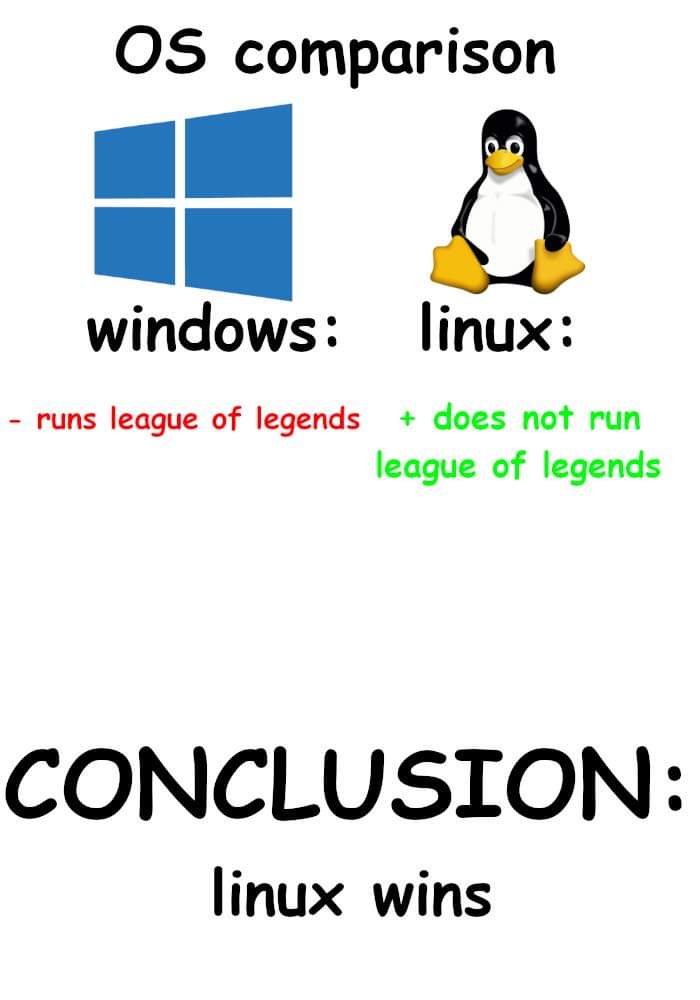this post was submitted on 27 Mar 2024
1442 points (97.1% liked)
Memes
52144 readers
934 users here now
Rules:
- Be civil and nice.
- Try not to excessively repost, as a rule of thumb, wait at least 2 months to do it if you have to.
founded 6 years ago
MODERATORS
you are viewing a single comment's thread
view the rest of the comments
view the rest of the comments

OpenBSD:
Conclusion: OpenBSD wins
My pocket calculator: does not run anything
Conclusion: my pocket calculator wins. Always
It runs calculations. Abacus wins again
Haha fools behold my pet rock, it never runs anything or anywhere.
Square block of concrete weighting 1 metric ton:
Doesn't support throwing it with human power
Conclusion: square block of concrete weighting 1 metric ton wins
Yes, this totally wins:

5318008
I thought all systemd haters would have died by now due to old age. At this rare chance, I have a question: How did it feel to live together with actual dinosaurs?
I finally gave up the hate and embraced the poeterring-ing a few years ago. Can confirm I de-aged by 15 years as a result.
Why do people hate systemd anyway? I'm not that tech-savvy but I've always used it and I don't recall ever having a problem with it
I think it's largely a combination of curmudgeons that hate change and people who are strict Unix ideologues. systemd, while being objectively better in many ways is a monolith that does more than one thing. This violates some of the Unix program philosophies (small programs that do one thing). The truth is that the script-based inits were terrible for dependency management, which is something that systemd explicitly addresses and is probably one of its greatest strengths, IMO.
EDIT: Corrected capitalization.
On a side note, it's systemd, no damn uppercase D at the end.
Good point. Fixed.
It's the main strength, and for that it deserves praise.
For the feature creep that goes into it, and everything hard requiring systemd stuff (way beyond just the init system) just to start, no thanks.
That's very fair. Having managed system services for custom application stacks with hard dependencies on one another, that strength is worth it to me.
I don't mean to come across as saying that the Unix philosophy is wrong. Just horses for courses. Systems where there is a likelihood of interdependent daemons should probably consider systemd. Where that's not an issue or complexity is low, more Unix-like inits can still be a solid choice because of their limited scoping and easy modification.
Again, init system is OK.
Suddenly logind, networkd, resolvd, timesyncd, and every other systemd subsystem is way too much inside the one supposed init system.
It's slow and heavy, and it does too many things. It's a monolithic piece of code so big it's getting too difficult to maintain, so it has more vulnerabilities than other alternatives. It's also taking over the whole system, to the point where Linux systems will soon be Systemd/Linux instead of GNU/Linux.
It's also developed and funded mainly by Microsoft, which is also something people don't really like. Microsoft are trying to make it similar to Windows in some ways, which makes it way more difficult to debug random errors.
And it doesn't follow the UNIX guidelines, which is just the cherry on top.
Calm down Lennart. Also, upstart was better and not ancient.
Upstart was better, but even Ubuntu, who was by the creators of upstart (Canonical) decided to switch to systemd after using upstart for a bit?
Yeah, I don’t know why. Upstart really was better.
What made it better?
Because it was a shameless copy of SMF which is also great.
Systemd is good actually
Wasn't a big reason some people don't like systemd because it didn't run on FreeBSD?
I run Gentoo with OpenRC.
Still need some systemd stuff for some software :|
I run Void with runit.
I've tried to completely avoid systemd, and so far I think I've managed. It's still a pain in the ass, because a lot of software depends on it.
As an upside, startup time on my old lappy went from 2+ minutes on barebones Arch with systemd to just under 40 seconds on Void with runit.
I don't even care about the boot times.
Perhaps because I don't use DEs my PCs boot up quickly, and servers aren't supposed to be rebooted outside their maintenance windows. So why would I care about pArAlLeL bOoTiNg.
Oh well, I'm just an old man yelling at clouds.
The thing about parallel booting is it's only faster in systems with lots of cores, and the overhead of the parallelized code is sometimes enough to negate the benefits in older processors.
My machine is a Core 2 Duo lappy, which allows me to run most modern programs cheaply. However, it's slow (even though I don't use DEs either), and laptops are the kinds of computers you boot multiple times a day. That's why I care about boot times. And in this case, you can see that booting with a parallelized init system is slower than booting with a "regular" one.
Yeah, Systemd might be the new fad, but I still believe there are lots of things to learn from the simple init systems. After all, an init system should only focus on initializing a system, and it shouldn't be as complex and complicated as Systemd is.
I might be just another old man yelling at clouds. But hey, that makes two of us now.
Yeah, I get you.
Though perhaps in such use-case it would do better with sleep states than poweroffs.
OpenBSD loses because it's permissively-licensed instead of copyleft.
I guess you use blob-free Linux-libre then?